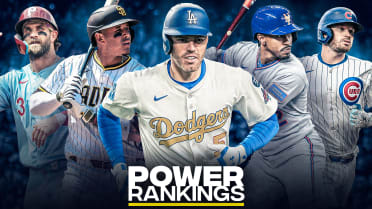SEATTLE -- Thursday marked one of the final significant dates on MLB’s offseason calendar: the deadline for salary arbitration-eligible players to exchange figures with their clubs. The Mariners had seven such cases and agreed to terms with each.
Here’s a primer on the day:
What is salary arbitration?
Players with three or more years of Major League service time but fewer than six (when they qualify for free agency) can negotiate their salaries for the upcoming season. Those salaries are based primarily on comparable players who signed contracts in recent seasons. The player and the club were required to present a salary figure no later than Thursday at 11 a.m. PT.
If the player and club cannot agree to terms, a hearing is scheduled in February. A panel of arbitrators will hear arguments from both sides, then select the salary figure provided by the player or the club.
Players and clubs can continue to negotiate salaries between Friday and a potential hearing on a one-year deal or multiyear deal, which is typically how these negotiations settle. Barring a trade, the Mariners won’t have any cases this spring.
What’s the situation for each arbitration-eligible Mariner?
1B Ty France (second year of arbitration, $6.775 million): For those wondering why France received a raise from the $4.1 million earned last year despite significant struggles at the plate, it’s rooted in the way that a player’s progression through arbitration works. Once a player is eligible, as France was last year, he remains so for each subsequent offseason until reaching free agency. As a player progresses through arbitration, he cannot earn less than the year prior. France’s slash line of .250/.337/.366 (.703 OPS) was his worst since joining the Mariners in 2020, but he still played in 158 games.
3B Luis Urías (third year, $5 million): Like France, Urías is also coming off a down year marred by injuries that limited him to 52 games, but he’ll receive a raise from the $4.7 million he earned last year. He’s in line for Seattle’s primary third-base job.
INF Josh Rojas (second year, $3.1 million): Rojas finished the year strong after coming over in the Trade Deadline deal that sent Paul Sewald to Arizona, posting a .721 OPS in 46 games for the Mariners compared to a .589 OPS in 59 games with the D-backs.
UTIL Sam Haggerty (first year, $900,000): The utilityman shuffled between Triple-A Tacoma and the Majors last year, playing in 52 games for the Mariners while hitting .253/.364/.341 (.705 OPS). He’ll be in the mix for an infield role this spring.
RHP Logan Gilbert (first year, $4.05 million): Most projections had Gilbert earning more than $4.05 million after a season in which he made 32 starts, pitched 190 2/3 innings and racked up 189 strikeouts. He’s a player to keep tabs on in years ahead, as starting pitchers typically become among the most expensive arbitration players.
RHP Justin Topa (first year, $1.25 million): After being acquired in an under-the-radar trade with the Brewers, Topa emerged from his second Tommy John surgery and blossomed into one of Seattle’s highest-leverage relievers. He'll again eye that role in 2024.
RHP Trent Thornton (second year, $1.2 million): Acquired ahead of the Deadline from Toronto, Thornton posted a 2.08 ERA and 197 ERA+ (league average is 100) in 23 outings for the Mariners down the stretch.
How often do cases reach arbitration?
Since president of baseball operations Jerry Dipoto took over after the 2015 season, the Mariners have gone to arbitration twice. Last year, Teoscar Hernández filed at $16 million while the team filed at $14 million -- a case the Mariners won. The other instance was in 2022 with Adam Frazier, who filed at $8 million against Seattle’s $6.7 million. In this case, the arbitrators sided with Frazier.
Only two other times since 2000 has Seattle gone to a hearing. In '15, reliever Tom Wilhelmsen lost his case requesting $2.2 million as the panel chose the team’s $1.4 million offer. In ’03, starting pitcher Freddy Garcia won his case for $6.875 million over the team's $5.9 million offer.
How will arbitration negotiations affect the rest of the Mariners’ offseason?
It shouldn’t at all. The Mariners already had an idea of what their offseason budget would be -- albeit later into the offseason than initially envisioned due to the uncertainty with their regional sports network situation -- and the arbitration-eligible players and their projected salaries were already considered in that figure.
Daniel Kramer covers the Mariners for MLB.com.




